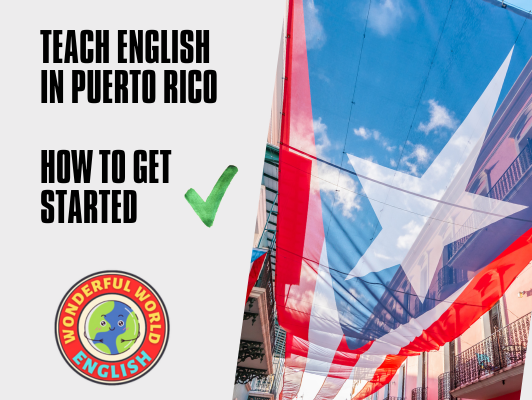Contents
Toggle
Meet David De’ Ath, founder, editor, and writer at Wonderful World English. With his extensive background as an English teacher, David provides valuable insights and practical tips on ESL for students and teachers alike.
Teaching English in Puerto Rico offers a distinctive opportunity for educators looking to explore a vibrant culture while engaging in a fulfilling teaching career.
This U.S. territory combines the allure of a tropical paradise with the practicalities of American affiliation, giving English teachers a chance at a unique professional experience.
Puerto Rico’s education system values bilingual proficiency, creating a consistent demand for skilled English teachers across the island, from bustling cities to serene coastal towns.
Those interested in teaching English in Puerto Rico should know the legal requirements, which typically include having a Bachelor’s degree and teaching certifications such as TEFL.
Securing a teaching position can be achieved through various educational institutions, ranging from public schools to private language academies.
Moreover, preparedness to embrace the local lifestyle and tackle potential challenges, such as language barriers or cultural differences, will contribute significantly to a teacher’s success and personal growth while living in Puerto Rico.
Key Takeaways
- English teaching positions in Puerto Rico are sought after for their cultural richness and professional opportunities.
- A Bachelor’s degree and teaching certification are standard prerequisites for teaching English in Puerto Rico.
- Being well-prepared and adaptable is crucial to overcoming the challenges associated with teaching and living in Puerto Rico.

Puerto Rico’s Education System
The education system in Puerto Rico offers options between public and private institutions and requires specific certifications for teaching English.
While Spanish is the primary language, English is also an official language and is taught in schools.
Public vs. Private Schools
The government funds public schools in Puerto Rico and provides education at no cost to students.
As of 2013, there were 1,460 public schools on the island.
Conversely, private schools offer alternative curricula and may have different resources available. Approximately 764 private schools operate in Puerto Rico.
Language Requirements
Educators in Puerto Rico often face the challenge of teaching English to residents who primarily speak Spanish.
Therefore, it is imperative for teachers to understand and adapt to their students’ language needs.
English is the language of instruction for federal agencies and is mandated as a subject in schools.
Related: Is English Harder to Learn than Spanish? – Teacher’s Answer
Certification for Teaching
Professionals who aim to teach English in Puerto Rico typically require a bachelor’s degree in English, Education, or a related field.
Furthermore, certifications specific to teaching English as a Second Language enhance candidates’ qualifications and are frequently sought by employers.

Legal Requirements
Before embarking on a teaching career in Puerto Rico, educators must know the legal requirements, including obtaining the appropriate visa and work permits, possessing the necessary qualifications and experience, and securing the required background checks and clearances.
Visa and Work Permit Information
Educators coming from outside Puerto Rico need to have the appropriate work visa.
For U.S. citizens, this is straightforward since Puerto Rico is a territory of the United States.
Non-U.S. citizens typically require a work permit or visa, which must be arranged with the Puerto Rican and U.S. authorities prior to arrival.
Qualifications and Experience
The minimum requirement to teach English in Puerto Rico is often a bachelor’s degree in education, English, or a related field.
In addition, teachers must pass the Puerto Rico Teacher Certification Exams to apply for a teaching certificate.
Teaching experience, while not always explicitly required, can be crucial for securing a teaching position.
Most countries around the world require a TEFL certificate as a prerequisite to live and teach legally in their land.
For some insights into TEFL certificates, the guide below has it all!
Related: TEFL Certificates: Your Guide to Teaching English Abroad
Background Checks and Clearances
Potential teachers must undergo various background checks to fulfill legal requirements, which might include a criminal history check and a review of their professional conduct.
Moreover, educators must provide proof of legal status in Puerto Rico and may need other clearances as stipulated by the Puerto Rican Department of Education.

Finding Teaching Opportunities
Securing a position as an English teacher in Puerto Rico involves researching available jobs, networking within the community, and possibly working with recruitment agencies.
The market for English teachers in Puerto Rico offers a variety of opportunities due to its status as a bilingual region with a high demand for English education.
Job Boards and Resources
Job seekers should start by exploring online job boards, which frequently list opportunities for teaching English in Puerto Rico.
Websites like Indeed offer a range of positions across different educational institutions.
Additionally, specialized ESL websites provide insights into the job market for teachers looking to work in this region.
Glassdoor, and TeachAway offer a variety of listings for teaching positions across the island, including ESL roles in public and private schools.
These platforms allow users to filter searches by location, making it easier to find opportunities specifically in Puerto Rico.
The Puerto Rico Department of Education’s official website can be a direct source for public school positions, while ESL-specific sites like Dave’s ESL Cafe may also list opportunities in private language academies and tutoring services.
Networking through social media groups and education forums focused on teaching in Puerto Rico can further assist in uncovering job openings and connecting with potential employers.
Networking and Community Involvement
Networking plays a significant role in finding a teaching job in Puerto Rico.
Engaging with the local community and building relationships with local schools can open doors to job offers that might not be advertised publicly.
Attending local educational events or TEFL meetups and participating in community education programs can help establish valuable connections.
Recruitment Agencies and Fairs
Teachers may also consider the services of recruitment agencies that specialize in placing educators in overseas positions.
Such agencies often have connections with schools and educational institutions.
Attending job fairs can also be beneficial to meeting potential employers in person and learning about a variety of teaching roles available on the island.

Preparing to Teach in Puerto Rico
Before setting foot in the classroom, educators looking to teach in Puerto Rico must familiarize themselves with certain key aspects.
It’s imperative they understand local cultural dynamics, stay updated on the educational standards, and have effective classroom management strategies in place.
Cultural Awareness and Sensitivity
Educators should recognize the distinct cultural identity of Puerto Rico, which, while American, also encompasses rich Hispanic traditions.
Teachers must respect and integrate this heritage into their teaching methodology to connect better with students and staff.
The dual-language environment demands that teachers are proficient in English and have a fundamental understanding of Spanish.
Another Spanish-speaking country that is a popular destination among ESL teachers is Mexico!
Check out the guide below for more information.
Related: How to Teach English in Mexico in 2024 | How to Get Started
Curriculum and Educational Standards
Adhering to the curriculum and educational standards in Puerto Rico is crucial for teachers.
Puerto Rico follows a standard-based education system similar to other U.S. states.
A Bachelor’s degree in a relevant field is often required, and educators must align teaching plans with the Puerto Rican Department of Education guidelines to ensure a cohesive learning experience for students.
Classroom Management Strategies
Effective classroom management is the cornerstone of a successful educational experience.
In Puerto Rico, this may involve dealing with bilingual classrooms and a variety of educational needs.
Educators should develop strategies that foster an inclusive, engaging environment and address their students’ diverse learning styles.
It’s important for teachers to establish clear rules and routines that support a structured yet flexible learning environment.

Living in Puerto Rico
Relocating to Puerto Rico offers a vibrant cultural experience and the convenience of a U.S. territory.
Teachers considering the move should understand the logistics involved, the housing market, and the financial aspects of living on the island.
Relocation Logistics
When one relocates to Puerto Rico, one must consider travel documentation and the import of personal goods.
U.S. citizens can travel freely to Puerto Rico without a passport as a U.S. territory.
However, someone relocating should check the latest requirements for vaccinations and other entry necessities.
It’s also advisable to enquire about shipping belongings, as there could be taxes on certain items brought into the territory.
Housing and Accommodations
Accommodation options in Puerto Rico range from urban apartments to beachfront homes.
Cities like San Juan offer modern living spaces, while areas outside the capital may provide more spacious options but with fewer amenities.
Renting is common, and teachers can expect to sign a lease, typically for one year.
It’s important to factor in utilities, which may not be included in the rent and may be costlier than on the mainland due to island infrastructure.
Cost of Living and Salary Expectations
The cost of living in Puerto Rico can vary widely depending on the area.
Basic utilities for an 85m² apartment can cost around $190 monthly, while internet might be approximately $60 per month.
Due to import costs, food expenses also tend to be higher than in many U.S. states.
In terms of salary, English teachers can expect varying figures depending on their qualifications and type of employment.
Private schools and language institutes often offer competitive salaries compared to local public schools.
It is essential to compare these salaries to living expenses to budget accordingly.
Related: Top 5 Countries for High-Paying English Teaching Jobs (2024)

Challenges and Solutions
Educators face specific challenges when teaching English in Puerto Rico but can employ practical solutions to enhance the learning experience.
Language Barriers
Teachers often encounter students with varying levels of English proficiency, which necessitates differentiated instruction strategies.
One solution is implementing language immersion techniques to encourage English usage, paired with visual aids to support comprehension.
For a complete guide on how to effectively teach English to young learners, the link below has it all!
Related: How to Teach English to Kids – A Teacher’s Guide
Resource Limitations in Schools
Many schools may lack sufficient teaching materials, making teachers need to be inventive in their approach.
Utilizing online resources and encouraging peer-to-peer learning can help compensate for material shortages.
Adjusting to Local Customs
Teachers must be cognizant of cultural sensitivities and integrate local interests into lessons to increase engagement.
They can collaborate with local educators to better understand and adapt teaching methods to suit the needs and customs of their students.

Conclusion
Teaching English in Puerto Rico represents a unique and rewarding opportunity that blends the challenges of a professional teaching career with the enriching experience of living in a culturally vibrant region.
The key to success in this role lies in understanding and respecting the local culture and education system, meeting legal and educational requirements, and adapting to students’ diverse needs.
Educators must be prepared to navigate the nuances of a bilingual environment, develop effective teaching strategies tailored to varied English proficiency levels, and embrace the local lifestyle.
Becoming an English teacher in Puerto Rico involves several steps, from obtaining the necessary qualifications and certifications to understanding the legal aspects of working in the territory.
Furthermore, it’s essential to consider the practicalities of living in Puerto Rico, such as housing, cost of living, and adapting to local customs.
Challenges like language barriers and resource limitations in schools require creative solutions and a flexible approach to teaching.
Overall, the experience of teaching English in Puerto Rico offers a unique blend of professional development and personal growth.
Educators who embark on this journey will contribute to students’ education and immerse themselves in an enriching cultural experience.
By preparing adequately, staying adaptable, and embracing the local culture, teachers can make a meaningful impact while enjoying the vibrant lifestyle that Puerto Rico has to offer.
We hope you found value in this information; feel free to contact us if you require any support.
Have a wonderful day!
Image Attribution: All images licensed via canva.com





